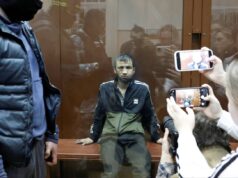The only surviving member of the neo-Nazi group, National Socialist Underground (NSU), Beate Zschäpe, appeared in a Munich court Monday. Accused of targeting Mediterranean immigrants, the NSU’s actions show that racism may be deeper and more widespread in contemporary German society than is commonly realized.
Prosecutors charged Zschäpe, 38, with complicity in the murder of eight ethnic Turks, a Greek immigrant and a German policewoman. Her group also committed 15 armed robberies and detonated two bombs. She now faces a life sentence. Prosecutors claimed the NSU hoped killing minorities, execution style, would intimidate many immigrants into leaving the country.

Beate Zschäpe stood in court before the start of her trial on Monday in Munich. (Photo: Reuters) |
Zschäpe is known to have a history of extremists views and she surrounded herself with like-minded people. According to the German news agency Deutsche Welle she came from a privileged academic family before joining a neo-Nazi group at the age of 18. Even before 1998, authorities suspected Zschäpe of building bombs, but police failed to find her. The NSU’s cover was blown in November 2011 after a botched bank robbery.
The case poses a number of challenges for the German authorities and is the focus of widespread media attention abroad. Victims’ families accuse the State’s domestic intelligence service of indirectly supporting neo-Nazi affiliated groups, including cash payments to informants with close ties to the extremist groups. A parliamentary committee will issue a final report on these accusations this summer. Court proceedings were also delayed for three weeks after certain news agencies from countries whose nationals were targeted were unable to secure seats in the courtroom. The German Supreme Court ordered a new accreditation process for the media after a Turkish newspaper filed suit.
With many victims’ relatives hoping for answers, still larger questions remain about extremism in Germany and Europe. While economic downturns can often lead to a resurgence in the far ends of the political spectrum, the NSU’s murders were carried out before 2008. The international financial crisis and imposed austerity measures in Europe continue to enable extremist elements to gain attention for their ideas, sometimes even gaining ground in government. Nationalist and anti-immigrant organizations continue to pose a challenge to the human rights of citizens across the continent.





